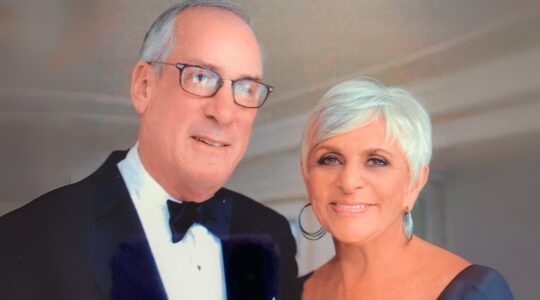This article is also available as a weekly newsletter, “Life Stories,” where we remember those who made an outsize impact in the Jewish world — or just left their community a better or more interesting place. Subscribe here to get “Life Stories” in your inbox every Tuesday.
Hettie Jones, 90, one half of a Beat generation power couple
Growing up in a middle-class Jewish family in Laurelton, Queens (her mother chaired local Hadassah chapters), Hettie Cohen dreamed of other places.
After college in Virginia she plunged into the Greenwich Village bohemia of jazz, Beat poetry and leftist politics and met and married an up-and-coming Black poet and playwright named LeRoi Jones. Together they created an influential magazine and publishing house and raised two girls.
In 1964 Jones would divorce her, changing his name to Amiri Baraka as he embraced the Black nationalist politics of the era. Hettie Jones soldiered on, writing more than 20 books — including an acclaimed memoir, “How I Became Hettie Jones” — teaching poetry and mentoring other writers. Her books for children and teenages often focused on people of color.
“In those and other works, Hettie set a path so sensationally followed by artists like Jacqueline Woodson today: children needed to learn about diversity because we lived in a diverse world,” wrote the critic Hilton Als.
A fixture in Manhattan’s East Village, she died on Aug. 13 in Philadelphia at 90.
Rodney Mariner, 83, a leading British Reform rabbi

Rabbi Rodney Mariner served as the convenor of both the Beit Din of the UK Reform movement and the European Region of the European Union for Progressive Judaism until his retirement in 2012. (EUPJ)
Rabbi Rodney Mariner, a Reform rabbi who led London’s Belsize Square Synagogue from 1982 to 2011, died this month. He was 83.
Born in Australia in 1941, Mariner worked as an engineer and a teacher before entering the rabbinate. As head of the Beit Din of the Movement for Reform Judaism for 22 years, he guided people through conversions and helped settle Jewish status questions for immigrants from the former Soviet Union.
“He was a model of common sense and good humor, two religious qualities whose importance are often under-estimated,” Rabbi Dr. Jonathan Romain, the current head of the Reform Beit Din, told the Jewish Chronicle. “As a congregational rabbi who often brought status cases to him, I learnt much from him both on Jewish procedures and, just as crucially, menschlichkeit.”
Milton Rube, 99, Cleveland rabbi who bucked tradition

In 1975, Rabbi Milton Rube founded Congregation Bethaynu in Cleveland, which grew to 600 families. (Cleveland Jewish News)
As a student at Yeshiva Chaim Berlin in Brooklyn — then one of the most prestigious Orthodox institutions in the country — Milton Rube told his rabbis he was going to be a physicist because he couldn’t tell them the truth: that he wanted to be a Conservative rabbi.
After graduating with a bachelor’s degree in physics from Brooklyn College, he enrolled at the Jewish Theological Seminary, and went on to serve various pulpits in the Cleveland area, including Temple on the Heights in Cleveland Heights and Congregation Bethaynu, which he founded in 1975.
At Bethaynu he bucked tradition again when he hired Kathryn Wolfe Sebo as the cantor at a time when few Conservative synagogues would do the same. She served full-time at Bethaynu alongside Rube for the next 14 years, until he retired in 1999. He “was a part of changing the mindset of future generations,” Sebo told the Cleveland Jewish News.
Rabbi Rube died on Aug. 14 at age 99.
Peter Stein, 87, sociologist who survived Nazi-occupied Prague

Peter J. Stein was a professor emeritus of sociology at William Paterson University, New Jersey and a Holocaust educator. (Holocaust Speakers Bureau)
When German troops entered Prague in 1939, Peter Stein’s family lost any faith that their lives would return to normal. His Jewish father and Catholic mother were labeled a “mixed marriage” (“Mischehe”), and while his father was spared the roundups that doomed much of his extended Jewish family, he was made a forced laborer and, in 1945, was deported to the Theresienstadt ghetto.
The family survived after years of terror and close calls, and on Nov. 3, 1948, they arrived in New York. Peter attended City College and then Princeton University, where he earned his Ph.D. in sociology.
In 2018, he wrote “A Boy’s Journey: From Nazi-Occupied Prague to Freedom in America.” Stein served as the co-director of the Genocide and Holocaust Studies Center at William Paterson University in New Jersey, where he was a sociology professor, and he helped to develop the Holocaust Speakers Bureau in Chapel Hill, North Carolina. Living in Washington, D.C., he served as a volunteer at the U.S. Holocaust Memorial Museum.
Stein died Aug 9. He was 87.
“Every society that we know of, there have been some people with more power and they can use the power to label other people as different, … as outsiders,” he told an interviewer in 2022. “So, I just would hope for more tolerance, more understanding of other people.”
Susan Wojcicki, 56, Jewish philanthropist and former CEO of YouTube

Susan Wojcicki speaks onstage during TechCrunch Disrupt SF 2016 at Pier 48 in San Francisco, Sept. 14, 2016. (TechCrunch/Wikipedia)
As one of Google’s earliest employees and most senior woman executive — and later as CEO of YouTube — Susan Wojcicki was a “role model throughout her industry and a link to her powerful company’s earliest and humbler days,” tech journalist Adam Lashinsky recalled.
She also was valued for her ability to communicate among a diverse and sometimes prickly workforce; in 2021, she mediated among employees who took different sides in the Israeli-Palestinian conflict. “With the persistence of antisemitic sentiment around the globe, it is our responsibility to do everything we can to make YouTube a better platform for the many communities who use it every day,” Wojcicki — who along with her husband Dennis Troper, a longtime Google executive, supported Jewish causes in the Bay Area, including the Oshman Family JCC and Gideon Housner Jewish Day School — wrote at the time. “This is a priority shared by not only me, but also … Google’s entire leadership team.”
Wojcicki stepped down from her role at YouTube in 2023, saying she wanted to focus on her family and her health. Earlier this year, her son Marco Troper, 19, died at Berkeley in what police listed as a drug overdose.
Wojcicki, 56, died Aug. 9. In a Facebook post, her husband said she had battled cancer for two years.
Howie Cohen, 81, ‘Mad Man’ who wrote famous campaigns for Alka Seltzer

“The best lines come out of real life. You catch one, you shine a light on it and you put it in the right situation,” said advertising copywriter Howie Cohen, who created a series of memorable campaigns for Alka Seltzer. (Courtesy Jerry Cohen)
Howie Cohen was given a tape recorder as a bar mitzvah gift, and at 13 the Bronx native used it to make his own versions of popular commercials. It stuck: At the Manhattan ad agency Wells Rich Greene in the 1970s, he and a partner coined two taglines for Alka Seltzer antacid that entered advertising history: ”Try it, you’ll like it” and “I can’t believe I ate the whole thing.”
The campaigns revived a struggling brand, and became “viral” years before the term came to mean a pop culture earworm you couldn’t ignore.
“The LA Times called me ‘a real life Don Draper,’” Cohen wrote in his blog, called “Mad Mensch” in a tribute to the AMC series about the advertising industry of his youth. “I’m a little more Jewish than he was but I get the comparison.” Cohen retired in 2017 from an agency he had founded. He died on March 2 at his home in Los Angeles. He was 81.
JTA has documented Jewish history in real-time for over a century. Keep our journalism strong by joining us in supporting independent, award-winning reporting.






